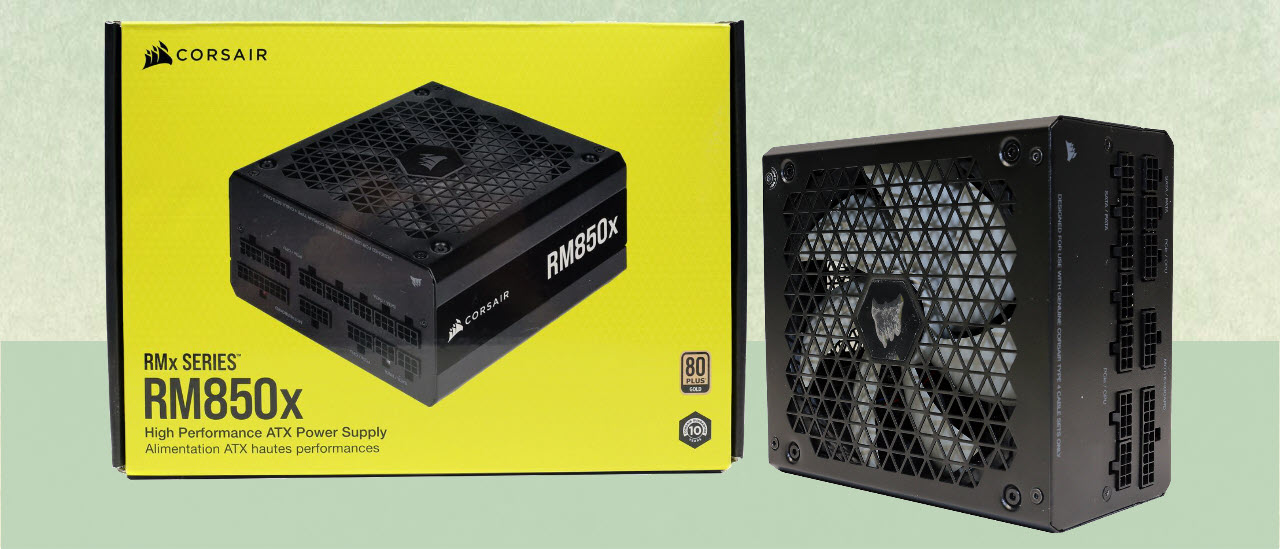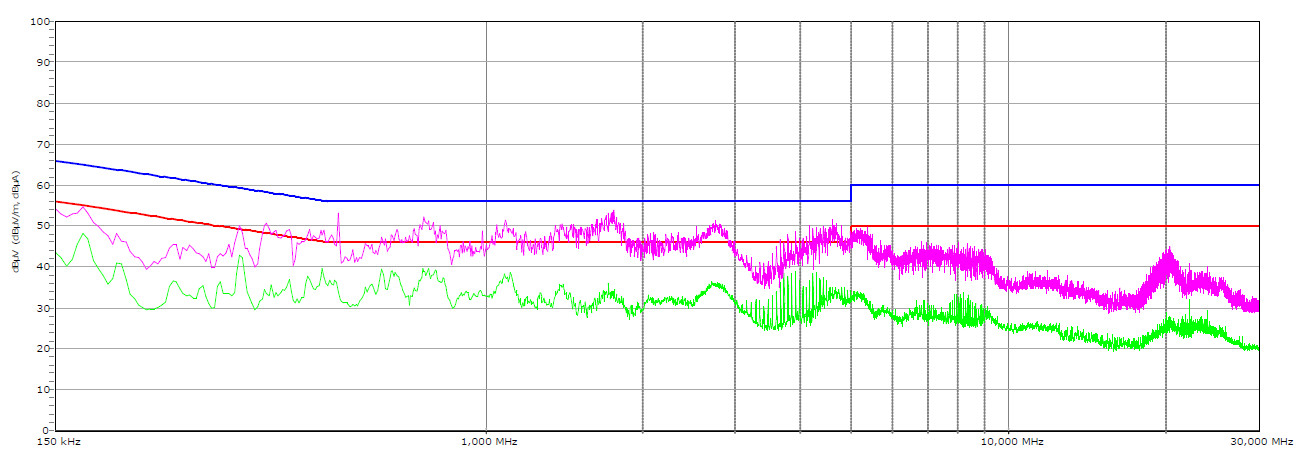Why you can trust Tom's Hardware
Advanced Transient Response Tests
For details about our transient response testing, please click here.
In the real world, power supplies are always working with loads that change. It's of immense importance, then, for the PSU to keep its rails within the ATX specification's defined ranges. The smaller the deviations, the more stable your PC will be with less stress applied to its components.
We should note that the ATX spec requires capacitive loading during the transient rests, but in our methodology, we also choose to apply a worst case scenario with no additional capacitance on the rails.
Advanced Transient Response at 20% – 20ms
| Voltage | Before | After | Change | Pass/Fail |
|---|---|---|---|---|
| 12V | 12.001V | 11.813V | 1.57% | Pass |
| 5V | 4.969V | 4.909V | 1.21% | Pass |
| 3.3V | 3.282V | 3.141V | 4.30% | Pass |
| 5VSB | 4.945V | 4.889V | 1.13% | Pass |
Advanced Transient Response at 20% – 10ms
| Voltage | Before | After | Change | Pass/Fail |
|---|---|---|---|---|
| 12V | 12.001V | 11.820V | 1.51% | Pass |
| 5V | 4.968V | 4.903V | 1.31% | Pass |
| 3.3V | 3.281V | 3.136V | 4.42% | Fail |
| 5VSB | 4.945V | 4.884V | 1.23% | Pass |
Advanced Transient Response at 20% – 1ms
| Voltage | Before | After | Change | Pass/Fail |
|---|---|---|---|---|
| 12V | 12.001V | 11.812V | 1.57% | Pass |
| 5V | 4.968V | 4.888V | 1.61% | Pass |
| 3.3V | 3.282V | 3.149V | 4.05% | Pass |
| 5VSB | 4.944V | 4.891V | 1.07% | Pass |
Advanced Transient Response at 50% – 20ms
| Voltage | Before | After | Change | Pass/Fail |
|---|---|---|---|---|
| 12V | 11.944V | 11.851V | 0.78% | Pass |
| 5V | 4.961V | 4.905V | 1.13% | Pass |
| 3.3V | 3.278V | 3.127V | 4.61% | Fail |
| 5VSB | 4.930V | 4.882V | 0.97% | Pass |
Advanced Transient Response at 50% – 10ms
| Voltage | Before | After | Change | Pass/Fail |
|---|---|---|---|---|
| 12V | 11.944V | 11.870V | 0.62% | Pass |
| 5V | 4.961V | 4.896V | 1.31% | Pass |
| 3.3V | 3.278V | 3.126V | 4.64% | Fail |
| 5VSB | 4.931V | 4.870V | 1.24% | Pass |
Advanced Transient Response at 50% – 1ms
| Voltage | Before | After | Change | Pass/Fail |
|---|---|---|---|---|
| 12V | 11.943V | 11.888V | 0.46% | Pass |
| 5V | 4.961V | 4.893V | 1.37% | Pass |
| 3.3V | 3.278V | 3.117V | 4.91% | Fail |
| 5VSB | 4.935V | 4.882V | 1.07% | Pass |
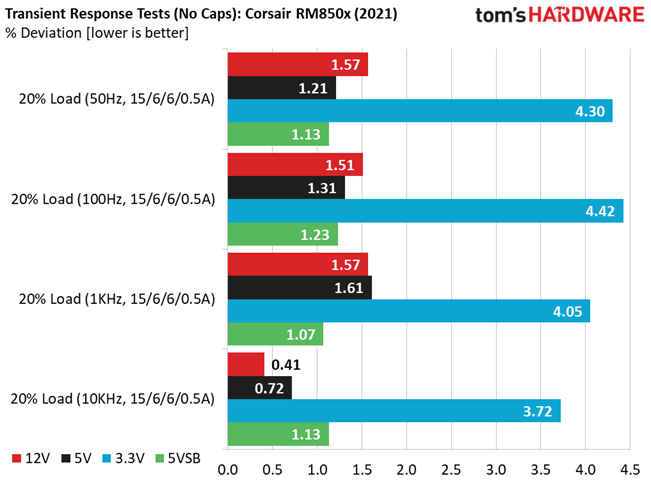
Results 25-29: Transient Response
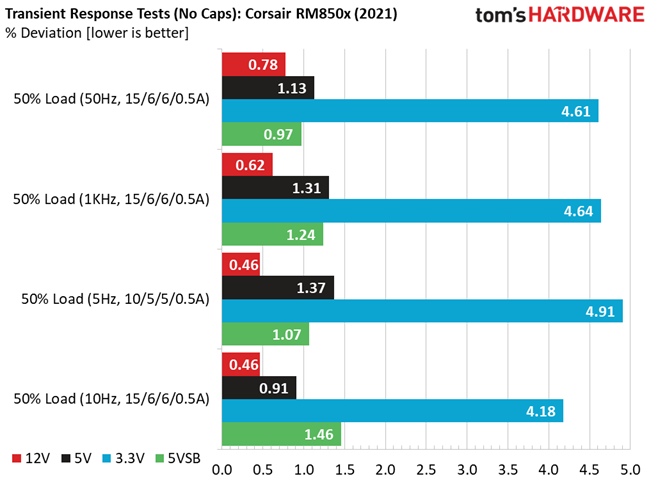
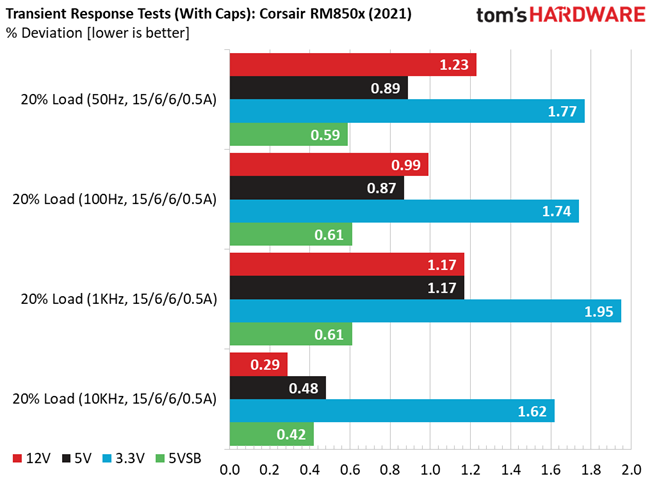
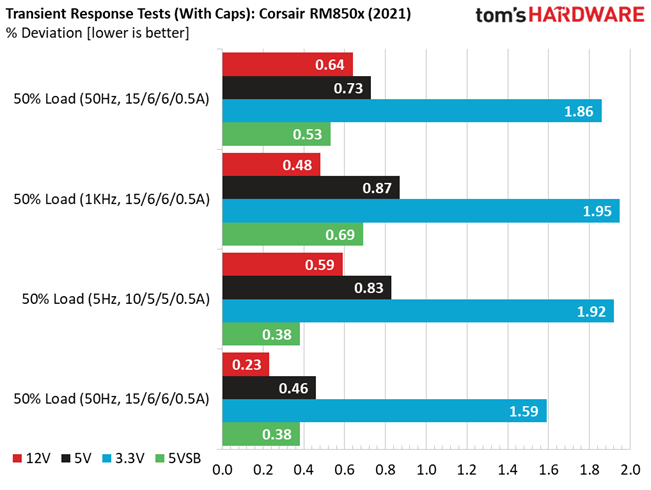
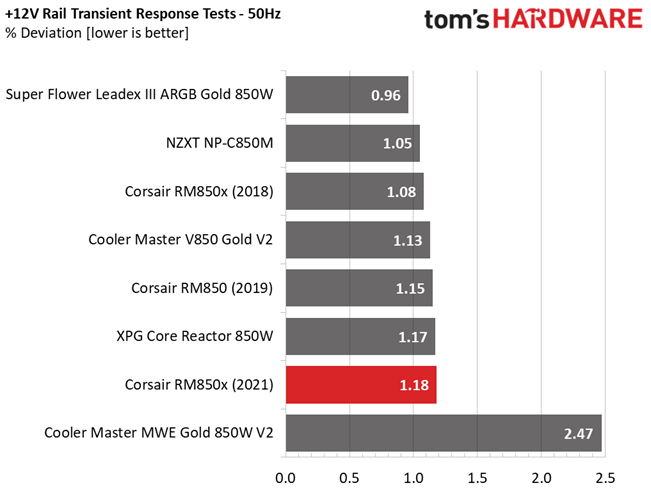
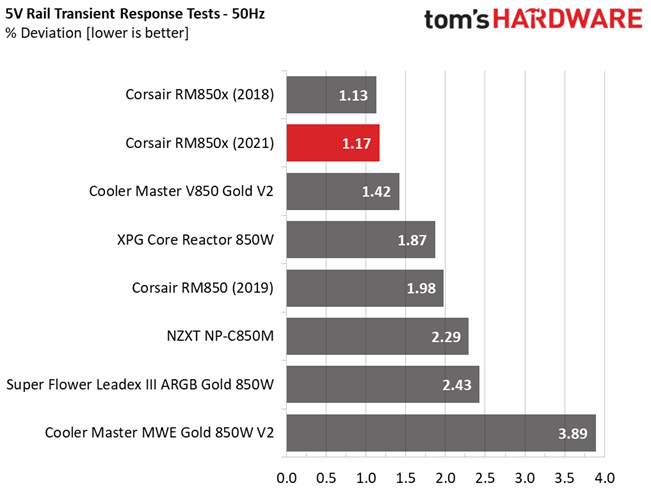
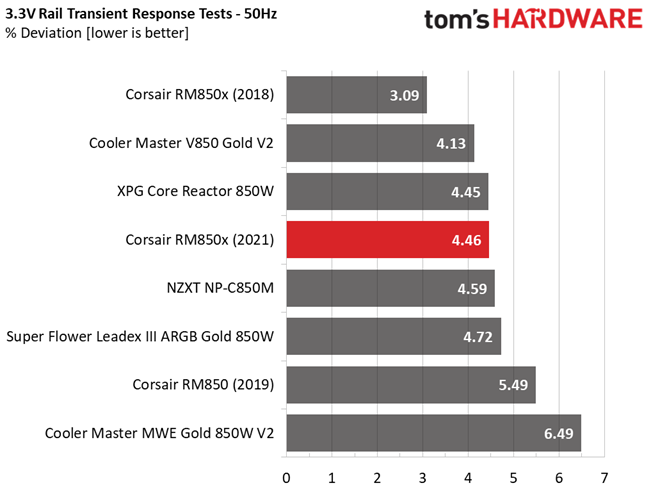
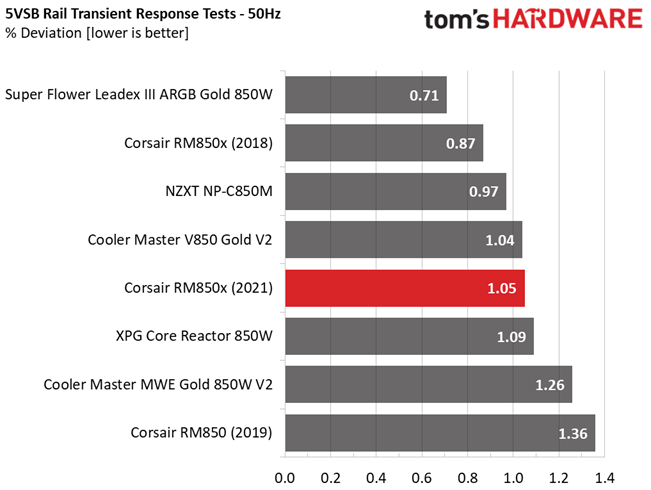
Transient response is about the same as the previous model on all rails but 3.3V, where the new model performs notably worse.
Turn-On Transient Tests
In the next set of tests, we measure the PSU's response in simpler transient load scenarios—during its power-on phase. Ideally, we don't want to see any voltage overshoots or spikes since those put a lot of stress on the DC-DC converters of installed components.
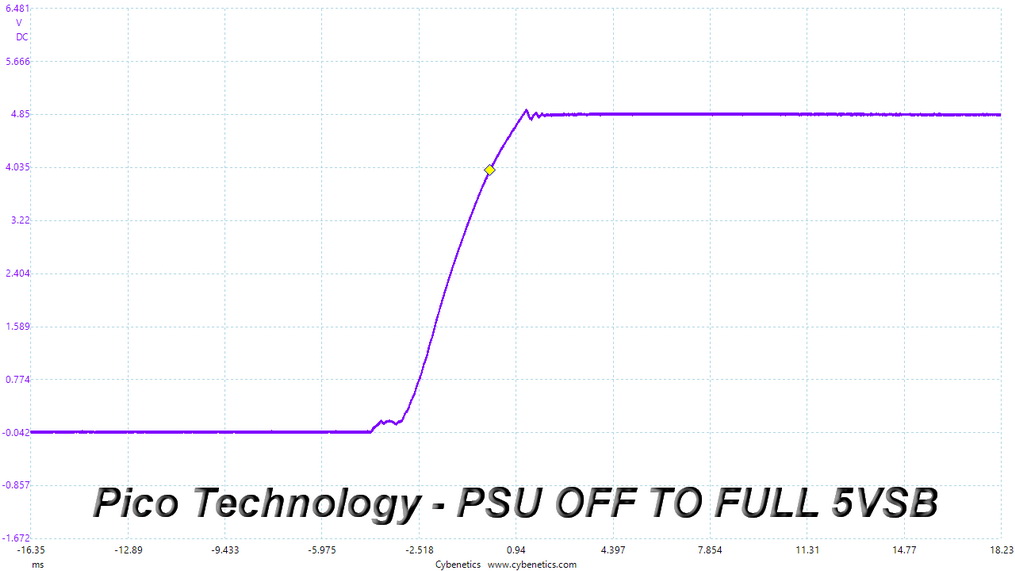
Turn-On Transient Response Scope Shots
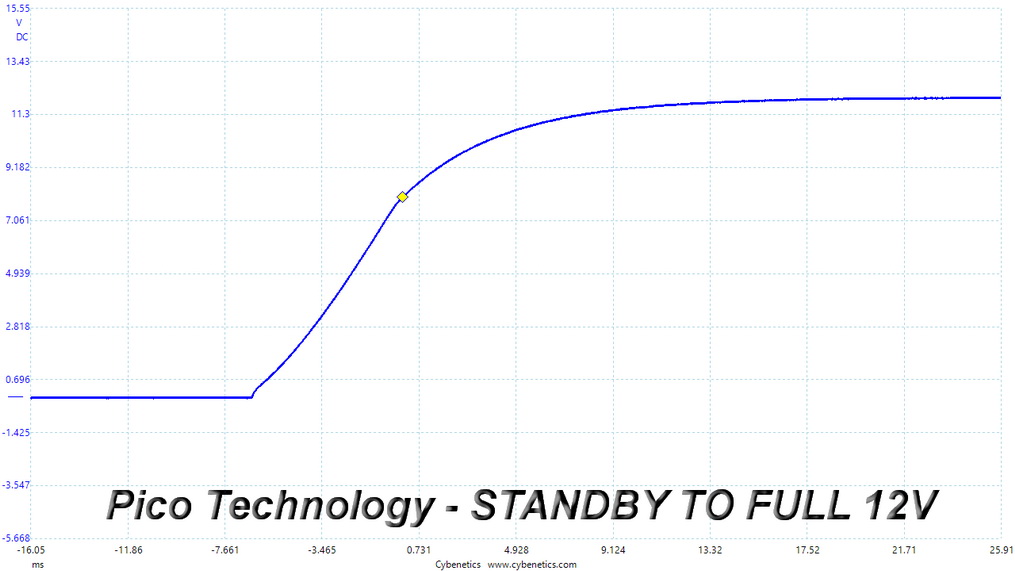
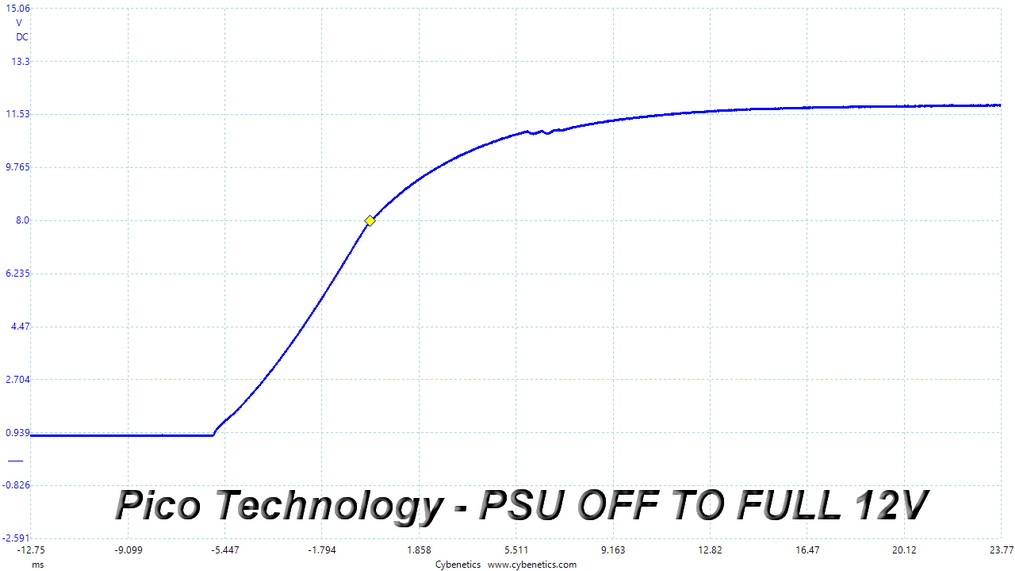
There is only a tiny voltage overshoot at 5VSB, which is nothing to worry about.
Power Supply Timing Tests
There are several signals generated by the power supply, which need to be within specified, by the ATX spec, ranges. If they are not, there can be compatibility issues with other system parts, especially mainboards. From year 2020, the PSU's Power-on time (T1) has to be lower than 150ms and the PWR_OK delay (T3) from 100 to 150ms, to be compatible with the Alternative Sleep Mode.
Get Tom's Hardware's best news and in-depth reviews, straight to your inbox.
| T1 (Power-on time) & T3 (PWR_OK delay) | ||
|---|---|---|
| Load | T1 | T3 |
| 20% | 49ms | 135ms |
| 100% | 50ms | 137ms |
The PWR_OK delay is within the 100-150ms region, so the PSU supports the alternative sleep mode recommended by the ATX spec.
Ripple Measurements
Ripple represents the AC fluctuations (periodic) and noise (random) found in the PSU's DC rails. This phenomenon significantly decreases the capacitors' lifespan because it causes them to run hotter. A 10-degree Celsius increase can cut into a cap's useful life by 50%. Ripple also plays an important role in overall system stability, especially when overclocking is involved.
The ripple limits, according to the ATX specification, are 120mV (+12V) and 50mV (5V, 3.3V, and 5VSB).
| Test | 12V | 5V | 3.3V | 5VSB | Pass/Fail |
| 10% Load | 4.7 mV | 2.6 mV | 3.2 mV | 5.9 mV | Pass |
| 20% Load | 4.5 mV | 2.7 mV | 3.0 mV | 5.7 mV | Pass |
| 30% Load | 6.5 mV | 2.7 mV | 3.3 mV | 5.9 mV | Pass |
| 40% Load | 5.6 mV | 2.6 mV | 3.3 mV | 5.6 mV | Pass |
| 50% Load | 5.4 mV | 2.8 mV | 4.3 mV | 6.4 mV | Pass |
| 60% Load | 5.2 mV | 2.9 mV | 3.6 mV | 6.1 mV | Pass |
| 70% Load | 5.4 mV | 3.1 mV | 4.8 mV | 6.5 mV | Pass |
| 80% Load | 5.6 mV | 3.1 mV | 9.5 mV | 6.3 mV | Pass |
| 90% Load | 5.8 mV | 3.3 mV | 11.4 mV | 7.3 mV | Pass |
| 100% Load | 8.2 mV | 5.4 mV | 11.2 mV | 7.3 mV | Pass |
| 110% Load | 8.1 mV | 5.6 mV | 11.3 mV | 7.2 mV | Pass |
| Crossload 1 | 5.6 mV | 4.1 mV | 12.4 mV | 7.2 mV | Pass |
| Crossload 2 | 8.4 mV | 4.5 mV | 4.9 mV | 6.8 mV | Pass |
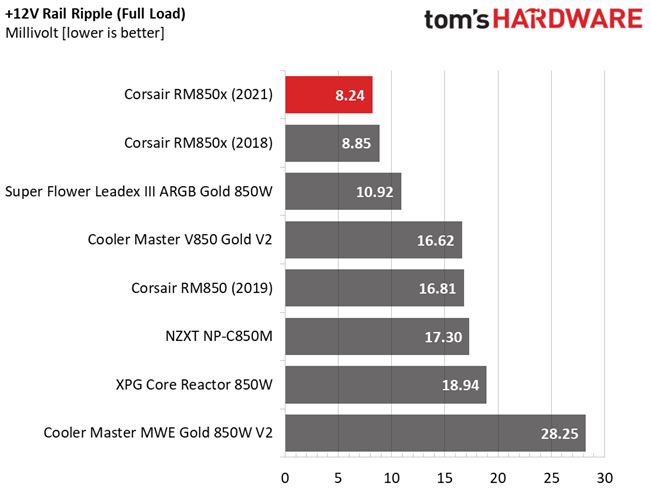
Results 30-33: Ripple Suppression
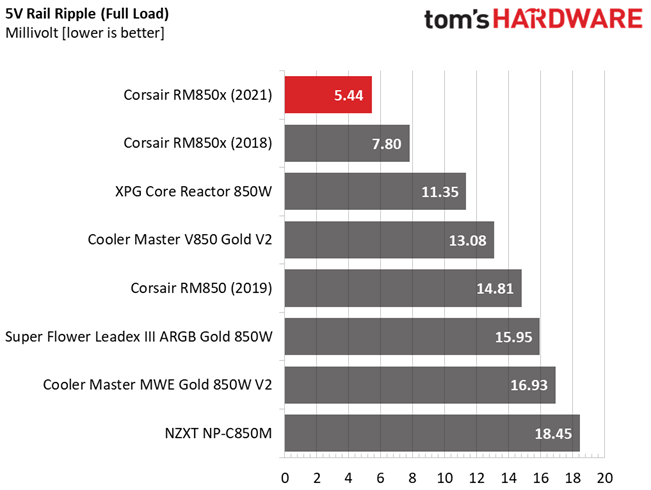
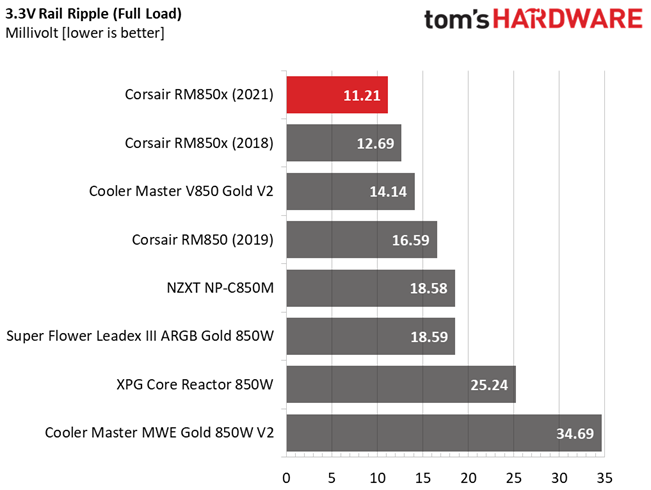
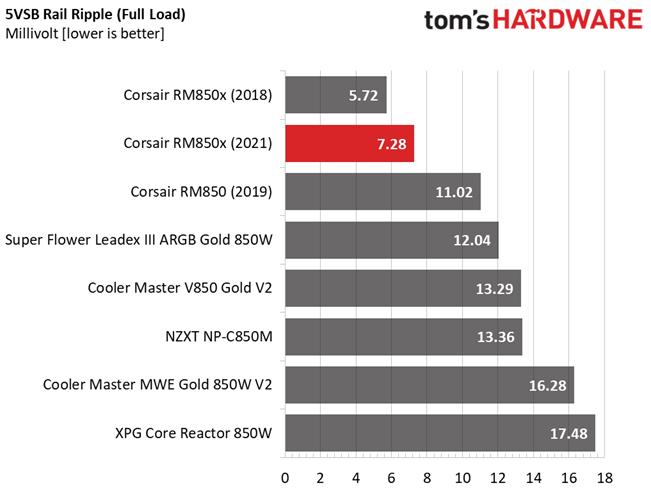
Ripple suppression is excellent.
Ripple At Full Load
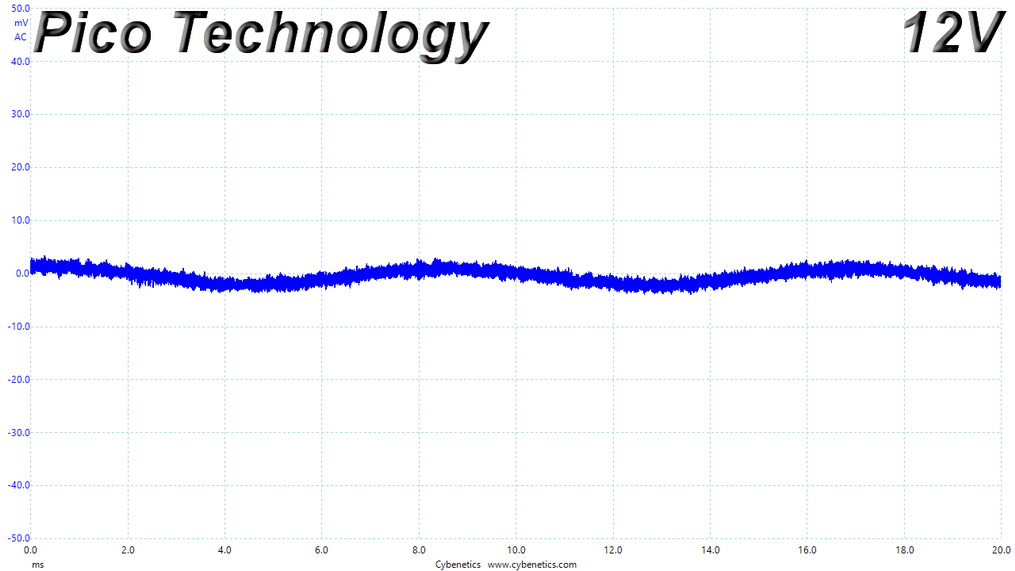
Ripple Full Load Scope Shots
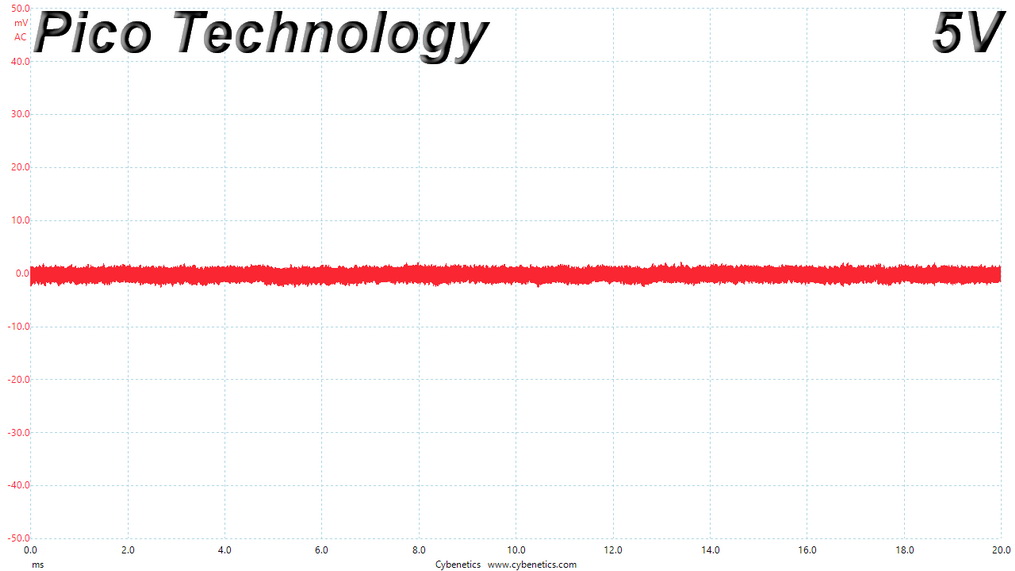
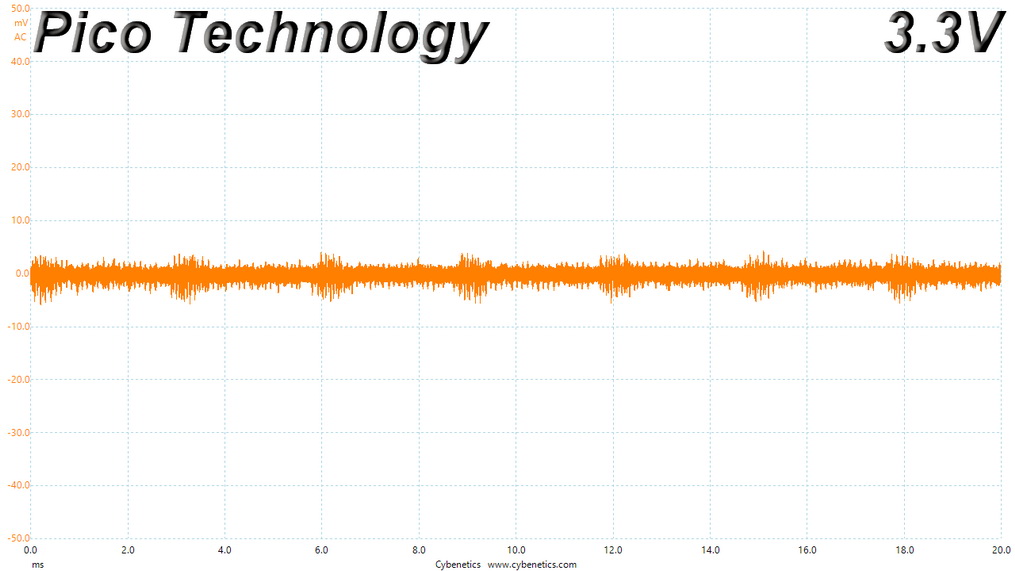
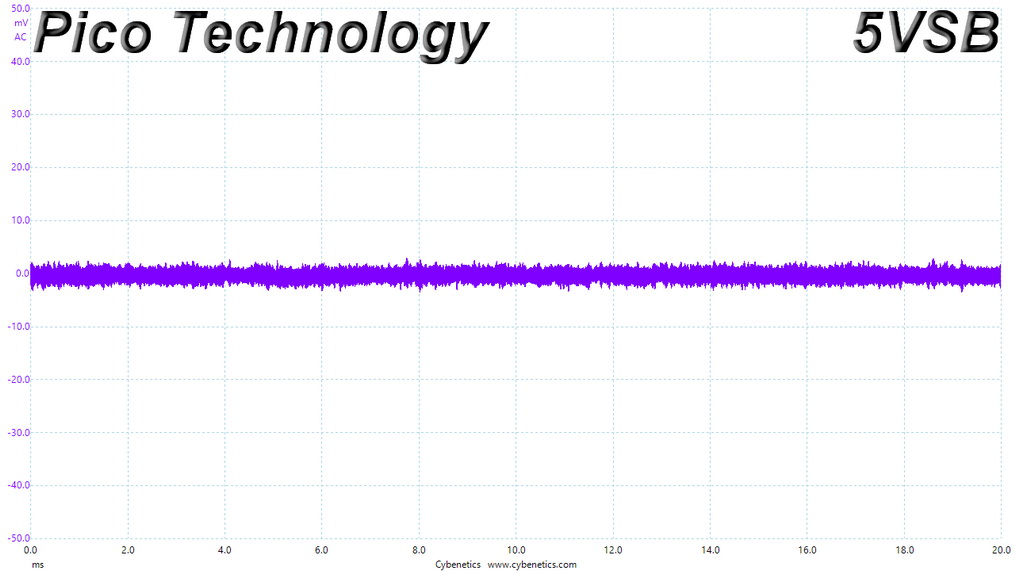
Ripple At 110% Load
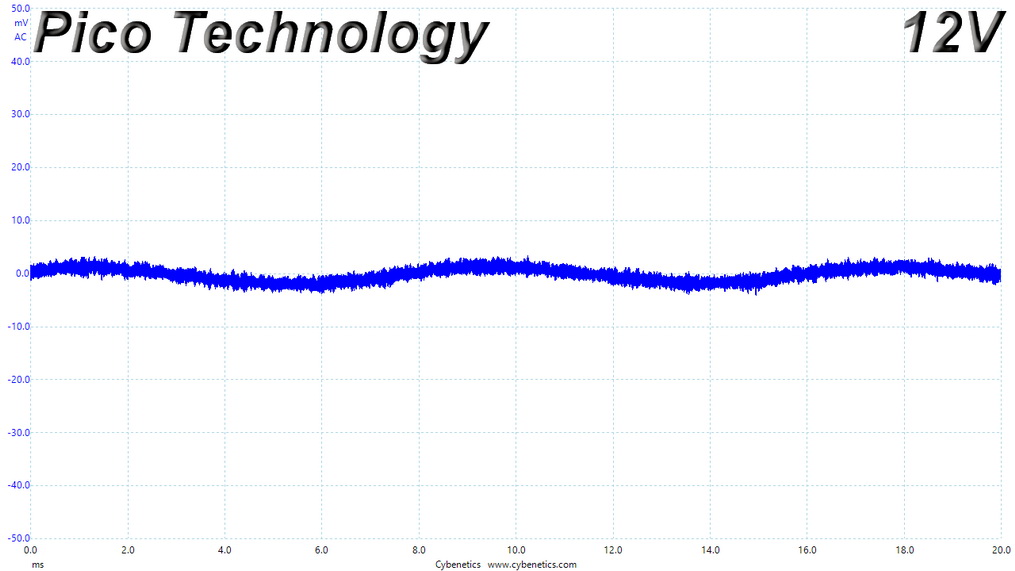
Ripple 110% Load Scope Shots
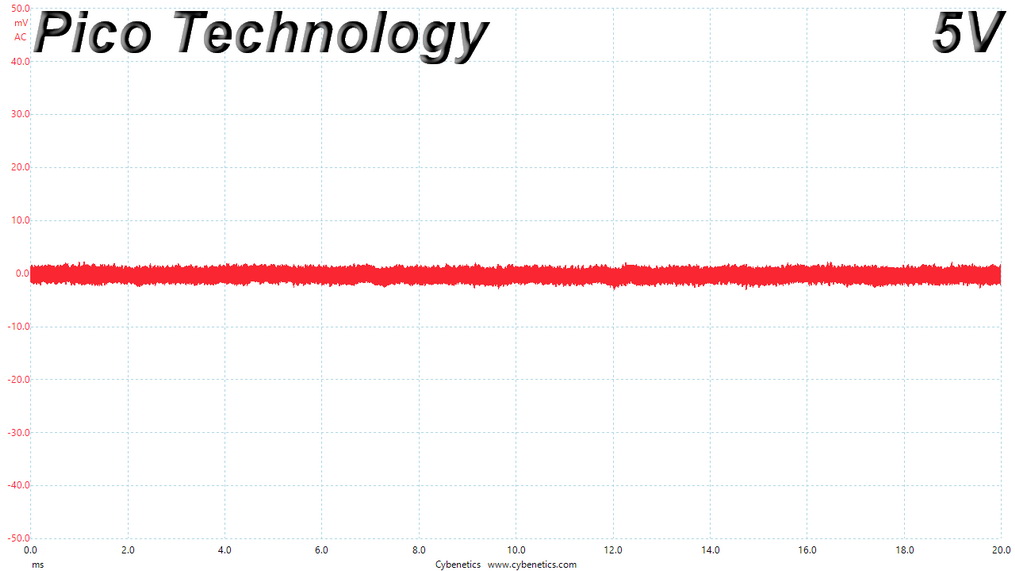
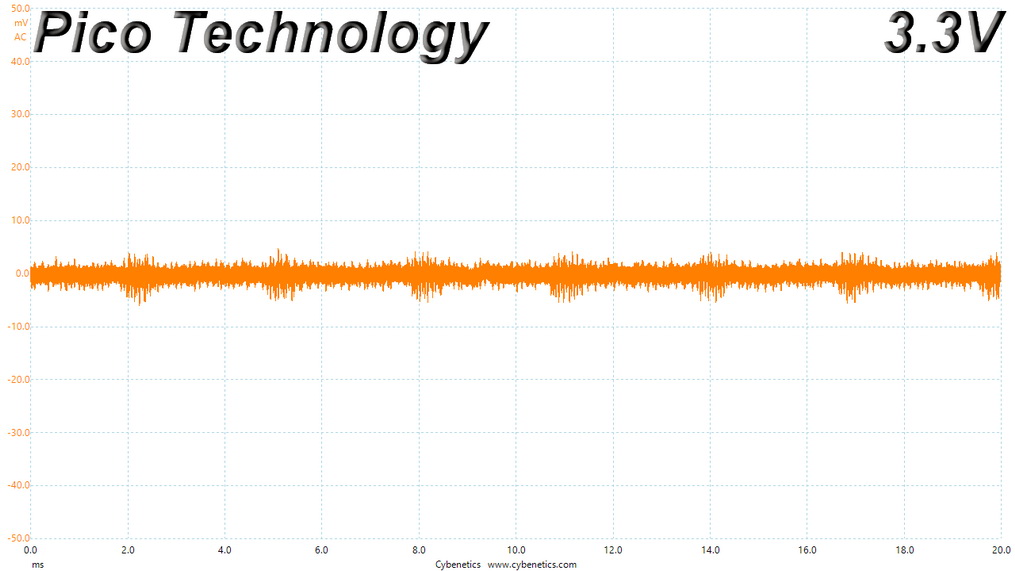
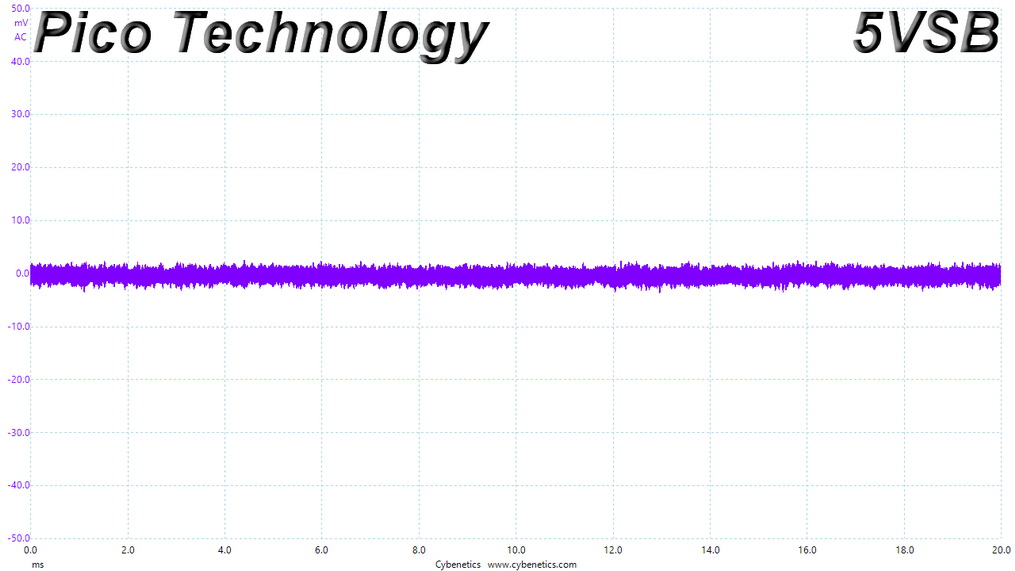
Ripple At Cross-Load 1
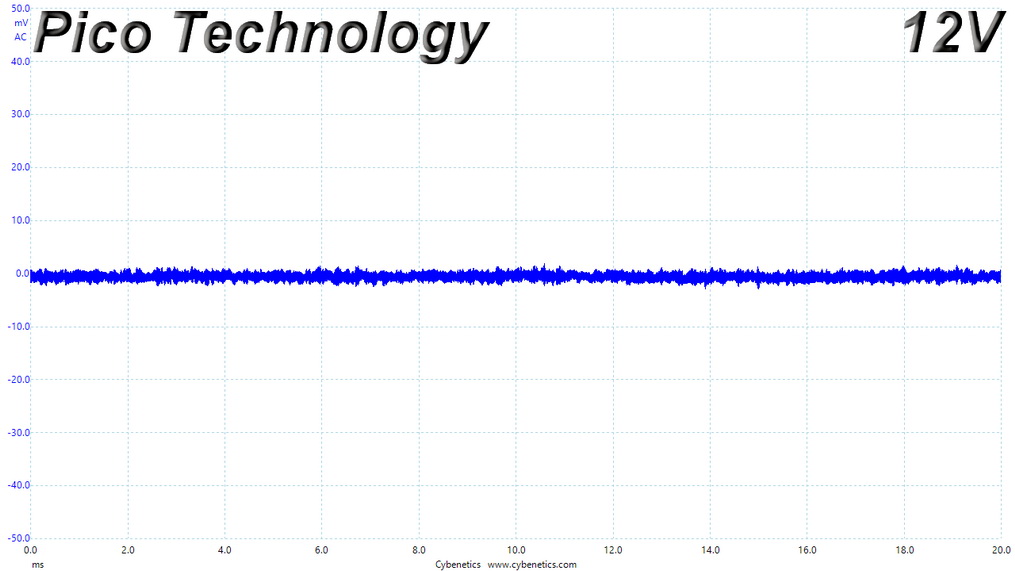
Ripple CL1 Load Scope Shots
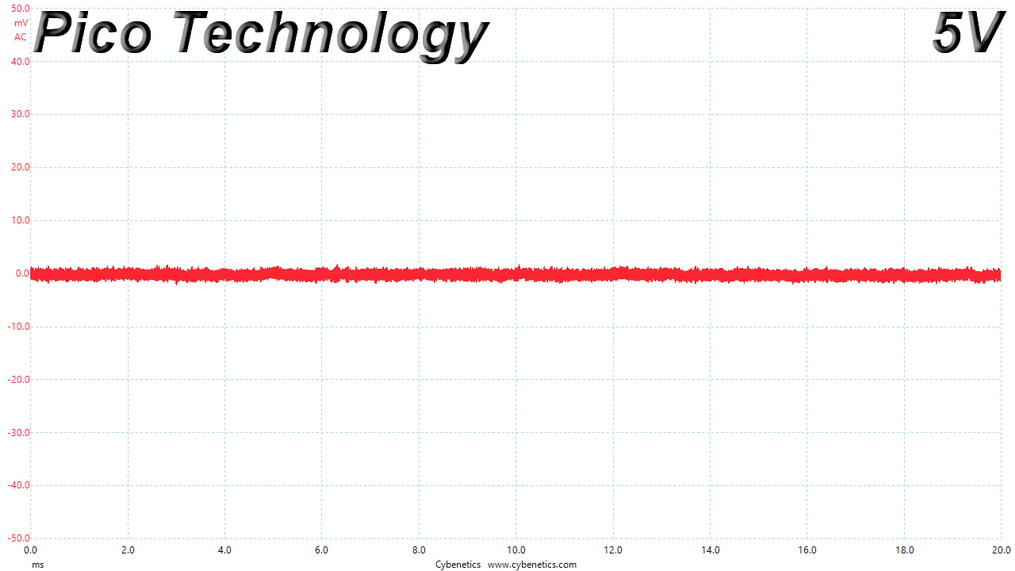
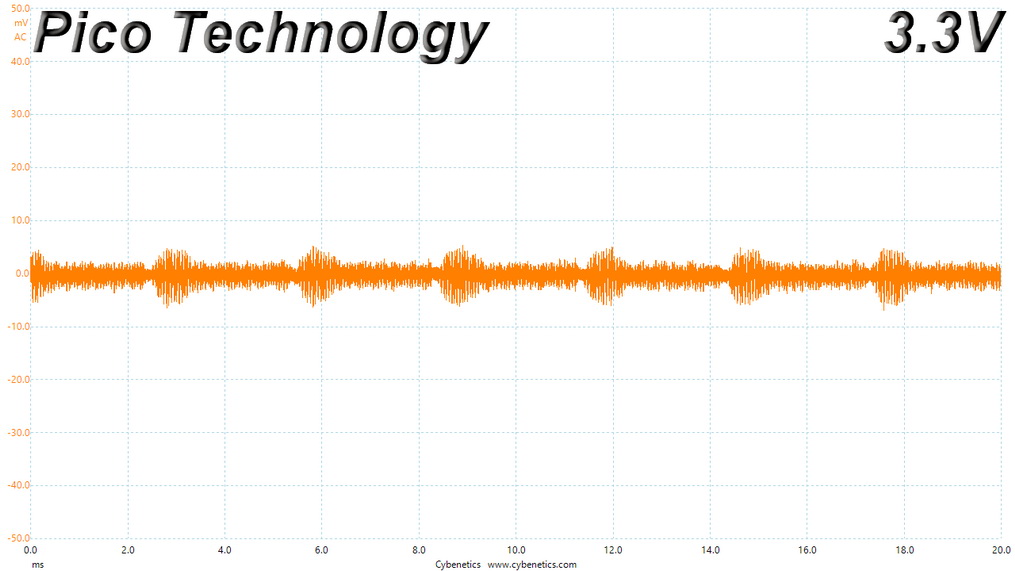
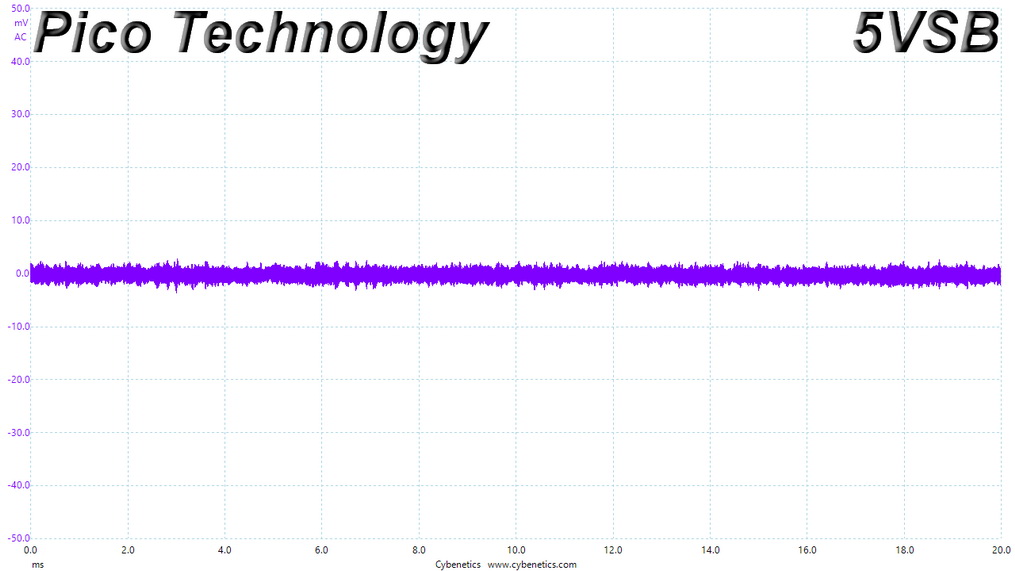
Ripple At Cross-Load 2
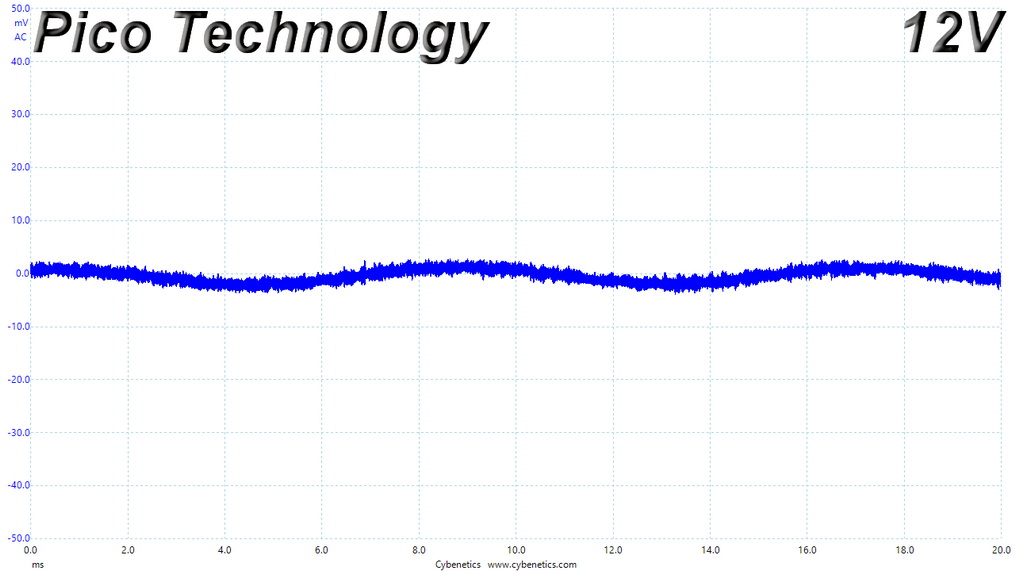
Ripple CL2 Load Scope Shots
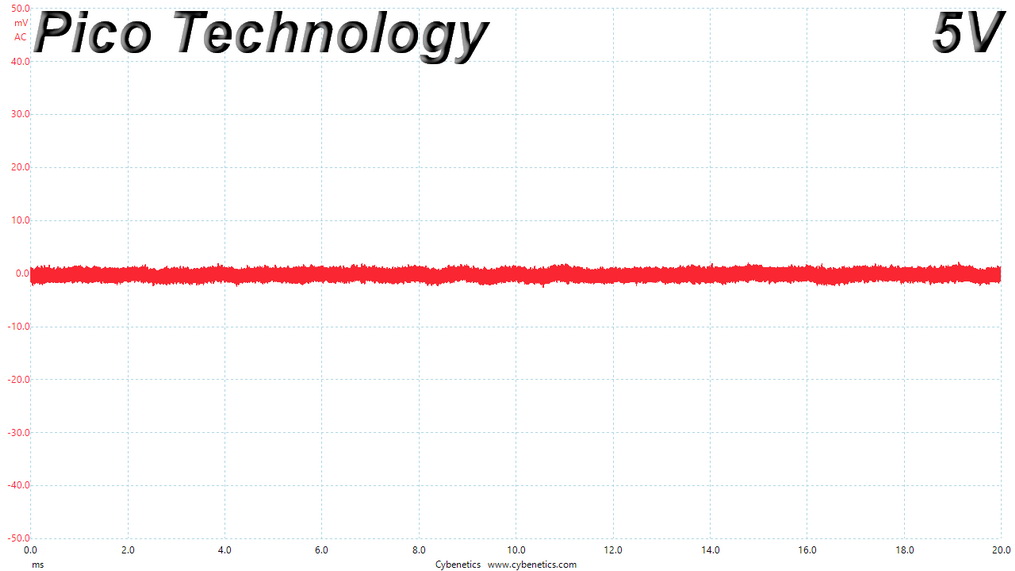
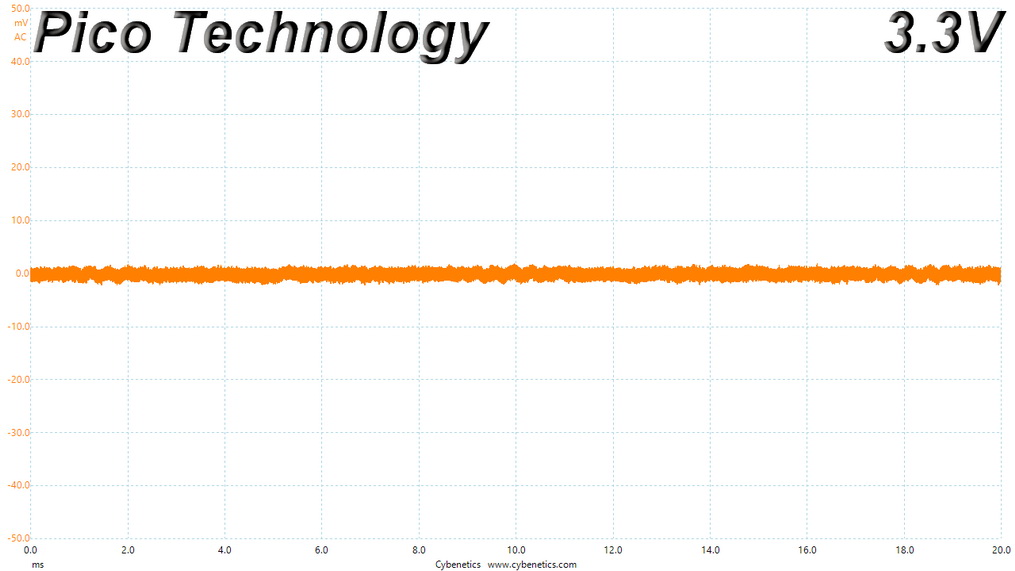
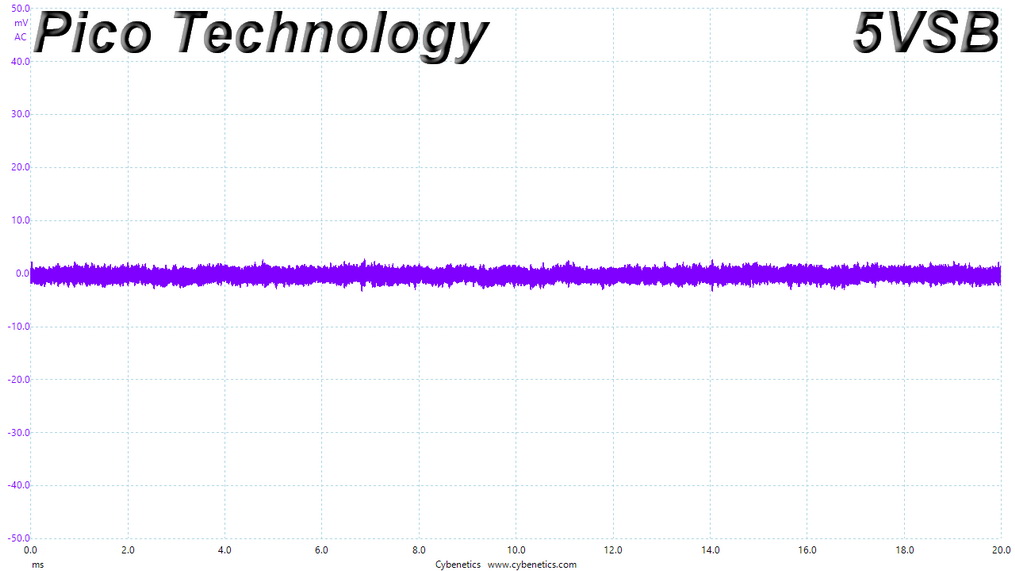
EMC Pre-Compliance Testing – Average & Quasi-Peak EMI Detector Results
Electromagnetic Compatibility (EMC) is a device's ability to operate properly in its environment without disrupting the proper operation of other nearby devices.
Electromagnetic Interference (EMI) stands for the electromagnetic energy a device emits, and it can cause problems in other nearby devices if too high. For example, it can be the cause of increased static noise in your headphones or/and speakers.
EMI emissions are low, with both detectors we used. This means that the PSU's corresponding filter does a great job.
MORE: Best Power Supplies
MORE: How We Test Power Supplies
MORE: All Power Supply Content
Current page: Transient Response Tests, Timing Tests, Ripple Measurements and EMC Pre-Compliance Testing
Prev Page Protection Features, DC Power Sequencing, Cross-Load Tests and Infrared Images Next Page Performance, Noise, Efficiency and Power Factor
Aris Mpitziopoulos is a contributing editor at Tom's Hardware, covering PSUs.
-
Isokolon shame they changed the fan. the 2015 & 2018 RMx were so great for low-noise enthusiasts.Reply
how the review classifies an almost 30db unit as "quiet" is beyond me. -
Udyr What makes this unit better than the Toughpower GF1?Reply
https://www.tomshardware.com/reviews/thermaltake-toughpower-gf1-850w-power-supply -
jsz031 Hi Aris.. like your reviews..Reply
small question. I noticed the Bulk/hold up caps get higher with wattage. can you explain how this impacts a general PSU?
for example/off topic, I have a 5 year old 550w G2 and it has a 400v 470uf cap. Just purchased a 550w g3 and the cap is lower capacity @ 400v 390uf.
Does this mean anything or am I overthinking it? is the 550w g2 better than "base" spec? I understand leakage can occur over time, I'm just not sure if its a downgrade or upgrade in specific areas.
thank you. -
jayjr1105 Reply
As long as they are meeting the ATX spec of 17ms hold up time, it doesn't really matter. The G2 was probably overkill so they cut costs by going with a lower capacity one.jsz031 said:Hi Aris.. like your reviews..
small question. I noticed the Bulk/hold up caps get higher with wattage. can you explain how this impacts a general PSU?
for example/off topic, I have a 5 year old 550w G2 and it has a 400v 470uf cap. Just purchased a 550w g3 and the cap is lower capacity @ 400v 390uf.
Does this mean anything or am I overthinking it? is the 550w g2 better than "base" spec? I understand leakage can occur over time, I'm just not sure if its a downgrade or upgrade in specific areas.
thank you. -
tomkawal Reply
..and worst quality coming from production line! Mine was covered with thick layer of metal salts from soldering. It stopped turning on. Works again after thorough cleanup.Admin said:The new Corsair RM850x is among the best PSUs in its category.
Corsair RM850x (2021) Power Supply Review : Read more -
tomkawal Beautifully presented. I was not so lucky with the unit I got, which stopped working after a month. Sent back to eBuyer guys and received it again not fixed (generally they requested ALL cables where I wanted only brick swap - this is totally unacceptable for me when the wires are in place tied to enclosure!) Raised ticket with Corsair with no answer in 2 days. Fixed on my own with one hour of cleaning the PCB from thick layer of soldering flux on the bottom side of PCB which caused leakage currents all over the board. Now it works. Horrendous experience and I don't recommend none of these businesses.Reply
